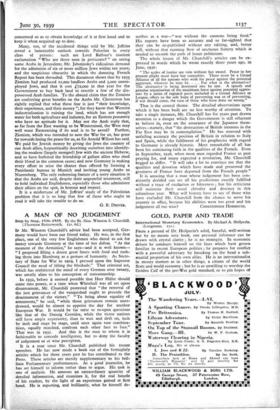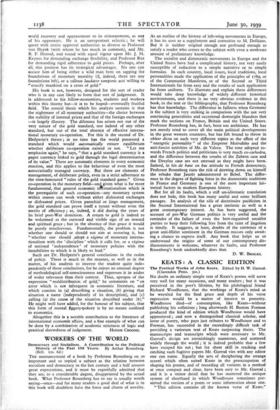GOLD, PAPER AND TRADE
International Monetary Economics. By Michael A. Heilperin. (Longmans. 15s.)
FROM a perusal of Dr. Heilperin's solid, forceful, well-written but by no means easy book, one personal inference can be drawn with crystal clarity ; he is no strategist. In economic debate he conducts himself on the lines which have grown familiar in recent European politics ; he prepares for conflict with a powerful adversary by knocking on the head a sub- stantial proportion of his own allies. He is an internationalist in money matters as in other things, a citizen of the world State and world economy ; but he is as unwilling to worship the Golden Calf of the pre-War gold standard, or to pin hopes of
world recovery and appeasement to its reinstatement, as any of his opponents. He is an unrepentant eclectic ; he will quote with entire approval authorities as diverse as Professor von Hayek (with whom he has much in common), and Mr. R. F. Harrod, and round with equal vigour upon Mr. J. M. Keynes for demanding exchange flexibility, and Professor Rist for demanding rigid adherence to gold prices. Perhaps, after all, this position has its strategical advantages. No one can accuse him of being either a wild man bent on sapping the foundations of monetary morality (if, indeed, there are any foundations left), or a callous laudator temporis acti willing to "crucify mankind on a cross of gold."
His book is not, however, designed for the sort of reader who is in any case likely to form that sort of judgement. It is addressed to his fellow-economists, students and workers within this thorny but—it is to be hoped—eventually fruitful field. The central thesis which his analysis sustains is that the nightmare of all monetary authorities—the choice between the stability of internal prices and that of the foreign exchanges —is largely illusory. The dilemma has arisen not out of the very nature of the gold standard, nor indeed of any other standard, but out of the total absence of effective interna- tional monetary co-operation. For this is the second of Dr. Heilperin's theses ; at no time has the world possessed a standard which would automatically ensure equilibrium whether deliberate co-operation existed or not. " Let me emphasise again," he says, " that a gold standard currency is a paper currency linked to gold through the legal determination of its value." There are automatic elements in every economic reaction, and this applies to the behaviour of even the most autocratically managed currency. But there are elements of management, of deliberate policy, even in a strict adherence to the time-honoured " rules of the gold standard game." Given co-operation in the monetary field—and given what is far more fundamental, that general economic it&rnationalism which is the prerequisite of such co-operation—any monetary system within reason can work without either dislocated exchanges or dislocated prices. Given parochial or jingo management, the gold standard can prove itself a tyrant without even the merits of efficiency ; as, indeed, it did during the years of its brief post-War dominion. A return to gold is indeed to be welcomed as the outward and visible sign of an inward and spiritual grace ; but in the absence of that grace it would be purely mischievous. Fundamentally, the problem is not whether one should or should not aim at restoring it, but " whether one should ,adopt a regime of monetary interna- tionalism with the ' discipline ' which it calls for, or a regime of national ' independence' of monetary policies with the instabilities to which it is likely to lead."
Such are Dr. Heilperin's general conclusions in the realm of policy. There is much in the manner, as well as in the matter, of his analysis to interest the student quite inde- pendently of those conclusions, for he enjoys an unusual degree of methodological self-consciousness and expresses it in asides of wider relevance than their context. Thus, apropos of the expression " maldistribution of gold," he comments on " an error which is not infrequent in economic literature, and which consists in (a) describing a situation, (b) giving that situation a name (independently of its description), and (c) calling (a) the cause of the situation described under (b)." He might well have added, for the honour of his subject, that this form of mental figgery-pokery is by no means confined to economics.
Altogether this is a notable contribution to the literature of international economic affairs, and a fine example of what can be done by a combination of academic strictness of logic and practical shrewdness of judgement. HONOR CROOME.











































 Previous page
Previous page